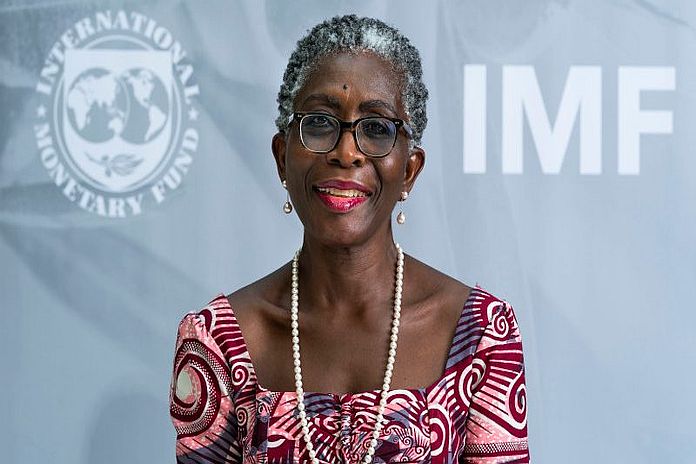-
- Opening Remarks by Deputy Managing Director Antoinette Sayeh at the Conference on South Asia’s Path to Resilient Growth, New Delhi, India
By Antoinette Sayeh
Over the past two decades, extreme poverty has declined from 500 million to fewer than 250 million people in Bangladesh, Bhutan, India, the Maldives, Nepal, and Sri Lanka – a remarkable success story for the region and the world.
Per capita income during this period has doubled, helping to deliver improved health care, education, and infrastructure, as well as better access to financial services, the Internet, and mobile technology to millions of South Asians.
Now, poverty reduction cannot be taken for granted and is instead the result of policy choices.
And identifying the right policies matters not just for the pace of growth but also for ensuring that growth is sustainable, inclusive and benefits all. The key overarching question is, how can South Asia return to the growth rates of the past two decades, achieve resilient and climate-friendly growth without a renewed buildup of macroeconomic vulnerabilities, and resume the momentum of poverty reduction?
By drawing lessons from South Asia’s own history as well as from cross-country comparisons with peers, our book shows that the right policy design is crucial for the region’s rapid growth trajectory. This becomes even more important as the effects of climate change are increasingly visible in South Asia. If left unaddressed, they could erase much of the progress on growth and poverty reduction. So the book explores three broad issues.
The first main theme involves policies that make growth inclusive, sustainable, and resilient. This covers a wide range of topics that we will touch upon during today’s sessions.
This includes the expenditure needs to meet the Sustainable Development Goals; improving equity through labor market and social protection reforms, as well as gender policies. They also include the benefits of digitalization, and policies to mitigate and adapt to climate change.
The second broad issue is the role of trade. Trade liberalization and the resulting diversification have helped South Asia narrow the income gap with other regions. This result highlights the large potential for further income gains from a renewed reform momentum and a better integration into Asian and global value chains.
But unfortunately, there are increasing signs of geo-economic fragmentation. We see the number of trade restrictions rising and the sectoral composition of trade restrictions has been shifting. Asia has gained a lot from openness and integration, and we hope for strong international cooperation to avoid fragmentation. That said, South Asia still needs to prepare for the worst.
The disruptions to key industries in the rest of Asia however provides opportunities for South Asia as global value chains realign. But to benefit from these developments, the region needs to put in place necessary structural conditions through further liberalization and regulatory reforms.
For its part, India needs to leverage its existing strength in services exports and extend it to job-rich manufacturing exports by deepening its global value chain participation and complementary structural reforms that can boost productivity, formal employment, and exports. Doing so would create a virtuous cycle of productivity growth and strong export performance. Trade and investment reforms, by reducing tariffs and non-tariff barriers, for both goods and in particular high value services such as professional services, will be pivotal in raising competitiveness and establishing regional supply chains to benefit South Asia.
The third overarching topic in the book is the role of macro-financial management through sound monetary policy frameworks, financial development, and better public financial management to improve the scale and quality of infrastructure investment.
Given signs of fiscal dominance in several countries, a credible strategy for fiscal consolidation is critical to keep inflation expectations anchored. At the same time, the region’s large infrastructure needs must be met despite limited fiscal space, through a combination of enhanced but prudent quality of public investment, and alternative financing strategies. And efforts must continue to strengthen the effectiveness of monetary policy frameworks.
So in a nutshell, South Asia’s future holds the promise of continued poverty reduction and rapid economic development that could make the region a powerhouse of the global economy. Unlocking this potential, however, requires bold reforms. History has shown that all South Asian countries have benefited from reform episodes in the past. They must build on these earlier successes and emerging opportunities to unleash a renewed dynamism.
Now to start the proceedings for the day, we have the privilege to hear from Shaktikanta Das, RBI governor, who kindly travelled from Mumbai to join us today.
The Governor is well known to all of you and needs no introduction. So I’ll take this opportunity to instead say a few words about India’s economy, given that we recently completed our annual health check in the form of the Article IV consultations and have just published our staff report on India. Having broadly recovered from the pandemic, India is a relatively bright spot in the world economy today, growing at rates significantly above its peer average.
Macroeconomic policies are responding to the significant headwinds, with fiscal policy measures supporting vulnerable groups and monetary policy addressing persistently high inflation. A world-class digital public infrastructure is facilitating innovation, productivity improvements, and access to public and financial services. India is making important progress on its structural reform agenda, and further implementation of the reforms would help unlock its growth potential.





